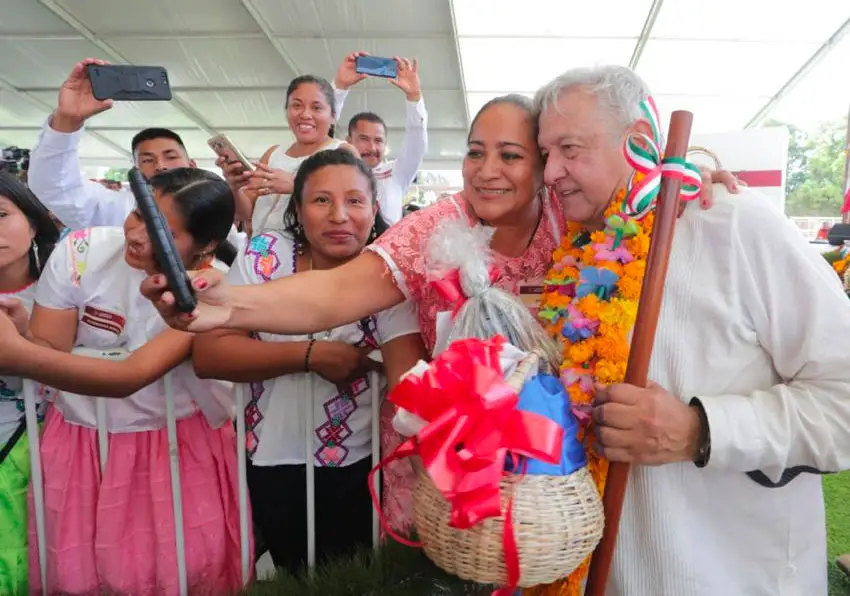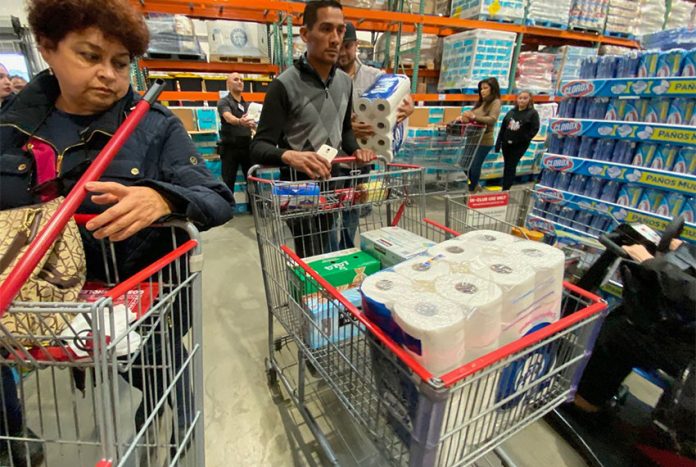The federal government has urged Mexicans to maintain “a healthy distance” from each other to avoid infection from the novel coronavirus Covid-19 while a leading business group has guaranteed the supply of food and other essentials as the country braces for a wider outbreak of the infectious disease.
The Health Ministry announced an initiative on Saturday known as “Sana Distancia,” or Healthy Distance, to encourage people in Mexico – where greeting all and sundry with a hug, kiss or handshake is de rigueur – not to get as close to each other as they normally would.
The ministry said that the Sana Distancia scheme would formally commence on March 23 and continue for four weeks.
“It’s social distancing, it’s about distance to keep us healthy,” Ricardo Cortés, general director of health promotion at the Health Ministry, said at a press conference Sunday at which it was announced that the number of confirmed cases of Covid-19 had increased by 12 to 53.
It remains to be seen whether President López Obrador will disregard the advice, as he has done until now. A deputy health minister urged people over two weeks ago to avoid hugs and kisses, but the president has ignored it.
He greeted his supporters in Guerrero with hugs, kisses and handshakes during a tour of the southwestern state over the weekend.
López Obrador posted five videos to his social media accounts on Sunday that showed him getting up close and personal with residents of coastal Guerrero who flocked to see him.
Without mentioning Covid-19 specifically, he said that he had “great faith” that the “misfortunes [and] pandemics … won’t do anything to us.”
The president’s blatant flouting of the social distance convention triggered criticism from health experts and critics who said that he is setting a bad example for the nation.
Meanwhile, the Business Coordinating Council (CCE), an influential business group, provided an assurance on Monday that its members – among whom are the Mexican Employers Federation and the Mexican Business Council – will maintain the supply of food and other essentials.
“The country has sufficient resources to guarantee food, processed and canned products, and cleaning and hygiene items to all Mexicans,” the CCE said in a statement.

“There are sufficient inventories to provide goods to families, homes, hotels and restaurants. … The private sector has an unwavering commitment to Mexico and for that reason we are applying protocols to maintain, to the greatest extent possible, normality in economic and social activity in the coming weeks,” it added.
The business group urged people to keep calm and not engage in panic shopping or stockpiling essential products.
“It’s not necessary or justified, and it affects those who have urgent needs,” the CCE said. “To face up to this difficult time, Mexicans have to be united and show our solidarity, discipline and maturity. If we all do our part, we’re sure to get through it.”
While the CCE is calling for people to voluntarily show restraint when shopping, several supermarkets in Tijuana have imposed limits on the purchase of personal hygiene products such as toilet paper, the newspaper El Universal reported.
Supermarkets in the northern border city have been bombarded in recent days with shoppers among whom have been residents of southern California who crossed the border to seek out items they couldn’t find at home due to a wave of panic buying across the United States.
Photos showing people re-entering the United States from Tijuana with their cars loaded with toilet paper and other hygiene products have circulated on social media, El Universal said.
The growing threat of a widespread coronavirus outbreak in Mexico has also led the National Autonomous University (UNAM) to take the decision to begin suspending classes from Tuesday on. All faculties will be shut down by the end of the week, UNAM said in a statement.
More than 350,000 students and some 40,000 academics will be affected by the decision. UNAM said that students will be provided with the opportunity to continue their studies at home, presumably via online learning.
The total suspension of classes at the university, Mexico’s largest and most prestigious tertiary education institution, will allow students to leave campus on or before March 20, the date on which UNAM mathematician Gustavo Cruz predicts a widespread Covid-19 outbreak could commence via community transmission.
The government has also announced that Easter holidays for the nation’s school students will start on March 20, two weeks earlier than scheduled, and continue until April 20.
However, unlike the United States and most Central American countries, Mexico has not announced any travel bans to help fight coronavirus, which had spread to more than 140 countries as of Sunday and killed close to 6,000 people.
While Aeroméxico has announced that it will reduce the frequency of its flights to Europe by 40%, it is likely that domestic routes will also be decreased due to a lack of demand as people increasingly choose to hunker down to avoid potential infection from the coronavirus, which originated in Wuhan, China, late last year.
Nayarit Governor Antonio Echevarría told a press conference on Monday that his government would ask the airline Volaris to suspend flights between the state capital Tepic and Tijuana due to the latter city’s proximity to the United States, where there were more than 4,000 confirmed cases of Covid-19 as of Monday afternoon.
“With all respect, we’re going to ask the airline Volaris to help us and cancel this flight. Unfortunately, the neighboring country is in phase 3 [of the outbreak] and we have to protect ourselves,” he said.
“My responsibility is to look out for the 1.3 million Nayarit residents and we have to do what has to be done to protect their health,” Echevarría added.
The Nayarit Fair has already been suspended due to the risk of Covid-19 transmission among attendees.
There is a growing list of suspended or cancelled events across Mexico due to the likelihood that community transmission of the infectious disease will become more prevalent in the near future, and the soccer clubs América and Cruz Azul played a match on Sunday at Mexico City’s cavernous Estadio Azteca without the presence of spectators.
Deputy Health Minister Hugo López-Gatell said late last week that the spread of Covid-19 could force the postponement or cancellation of as many as 8,000 events but stressed that the government will aim to ensure that there is not “unnecessary damage to the economy.”
However, with the peso already tumbling, the Mexican Stock Exchange taking a hit and an economy that was already stagnant before the new coronavirus was even heard of, Mexico, like countries around the world, looks set to suffer huge economic consequences as a result of Covid-19, whose list of victims is growing at an alarmingly fast pace.
Source: Reuters (en), El Economista (sp), El Universal (sp), Debate (sp), Milenio (sp)
